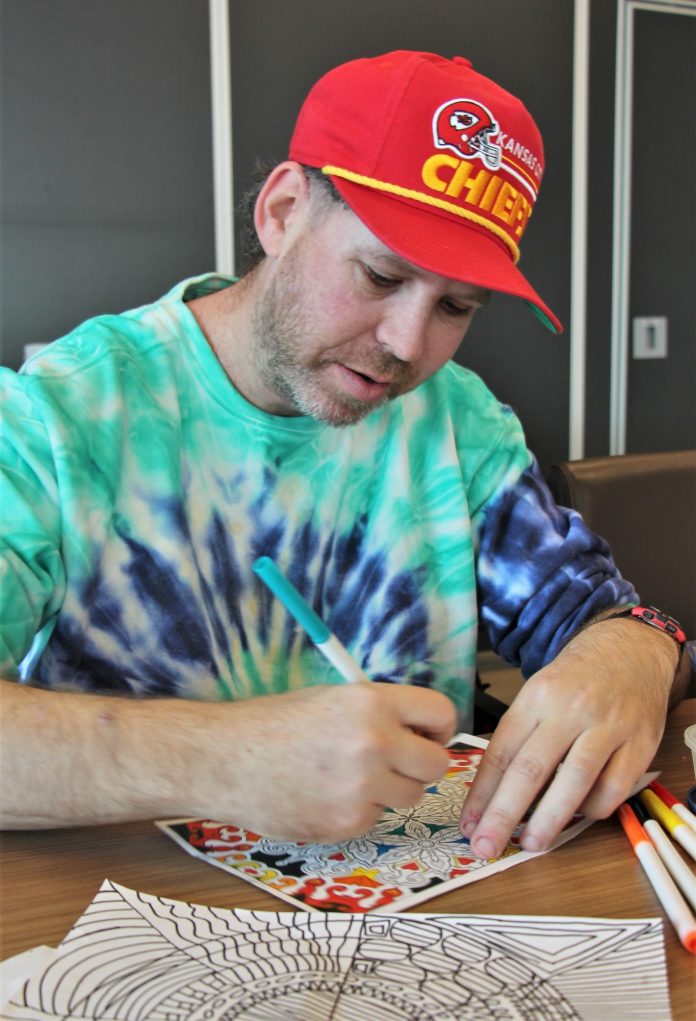Aside from the hushed voices of participants, the only sound at a recent HERO Art Group class was the scratching of pencils and markers fashioning mandalas on paper.
Around 20 clients of Waypoint’s HERO Centre come together each week at the Community
Health Hub to draw, paint and create. Bringing their artistic visions to life, they can set aside the struggles that compelled them to seek help in the first place. For Virginia Swanton, who smilingly admits her enthusiasm for art outweighs her talent, getting out of the house is another reason she enjoys the group.
“I like coming out and talking, meeting other people,” she said. “And the art is a way to
express my feelings. It brings me calmness and allows me to re-centre myself. I can come and be with other people who’ve experienced similar situations to what I’ve gone through with mental health, and they understand.”
Watching clients studiously bent over their work, Recreation Therapist Tamara Burke said she does a lot of the teaching herself. Although she doesn’t have an art background or
education, she has picked up some tricks since she began introducing art to her clients
around nine years ago. She explained the group allows clients to become empowered and
share their own art experiences with others. The purpose of the program is to provide an
opportunity to explore and play with different art forms, to engage imagination as a creative resource and to use art making as a form of self-expression.
“The idea was to give people who were struggling with their mental health somewhere to be creative in a social environment, but not necessarily be the centre of attention because a lot of them had anxiety about large groups,” said Burke. “Here, through art, you can become more confident, social and aware of yourself — and there’s real talent in this group.”
Doug McCormack is one client who has found purpose, belonging and self-esteem through
the group. As his colourful mandala took shape, he explained he aides Burke by helping with setup and takedown for the classes. In return, he has found a coping mechanism and a welcome diversion from the stresses of day-to-day life: “It gets me out and gives me a little distraction.”
Debbie Mullis said she likes exploring different mediums while taking advantage of the
opportunities she has been given to learn and grow through creativity: “I enjoy art. I’m not
very good at it, but I like it,” she said with a laugh. “I’ve gone through some things that were hard to deal with, and the people here have been wonderful.”
At a nearby table, Terry Boyer used a geometry set to draw an intricate, perfectly symmetrical design. He said he struggles with attention-deficit hyperactivity disorder, depression and anxiety, as well as a tendency to shut himself off from the outside world. Joining the art group was a personal turning point.
“The big thing is expanding my own artistic talent,” he said. “I’ve been shown some ideas that I never would have thought of. The social aspect — getting out and meeting new people — is also important. I firmly believe in sharing experiences and knowledge. Meeting all these people has really contributed to the experience. They’re helping me with my own wellness.”
The HERO Centre provides a slate of rehabilitation services, including employment, recreation and education programs. The goal is to collaborate with clients on their mental health recovery by building on their strengths and skills. Clients set the pace, supported by a team of professionals, to help accomplish the plan, which can mean finding work or a meaningful hobby, making connections in the community, or simply self-discovery








